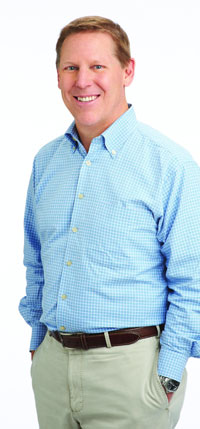As Gunts strode to the stage to receive his 2010 Emmy, announcer John Hodgman of “Daily Show” fame quipped to the studio audience, “Bucky Gunts majored in hotel management at Cornell, but changed to television after his thesis on icemaking machines was deemed wildly speculative and probably dangerous.” Although he actually graduated with an economics degree, the quest for new technology is legit. But, he says, “I’m a big believer that we should use it only if it enhances the broadcast rather than using it just because it’s available.” (He points to CNN’s awkward 2008 election-night holograms as an example of the latter.) One techno-toy that NBC plans to unveil during the Olympic diving competition is a “Splashometer” to measure each athlete’s impact. And those handy national-flag graphics that adorn each lane during swimming heats? They were Gunts’s idea.
During the seventeen days of the Games, Gunts’s responsibilities will include directing sixteen nights of primetime coverage as well as the opening ceremony; he cites Beijing’s opener four years ago as the highlight of his Olympic tenure so far. “It’s very important for us to get off on the right foot,” says Gunts. (Five days before the cauldron is lit, Gunts will even run in the torch relay, carrying the Olympic flame through the London borough of Haverford.) The details of the July 27 opening ceremony, designed by Danny Boyle (Oscar-winning director of Slumdog Millionaire), remain a closely guarded secret—but not to Gunts, who has long been familiar with its theme and choreography. “There’s some cool stuff in it, I can tell you that,” he says. “There will be some surprises.” One item of information that has been released: the production will include a twenty-seven-ton bell inscribed with the words of Shakespeare’s Caliban: “Be not afeard; the isle is full of noises.”
 The remainder of Gunts’s job in London—besides overseeing coordination of taped segments, graphics, live shots from the scores of cameras in myriad locations, and in-studio interviews and reports—is to wade through the noise and tumult as a sort of troubleshooter. This could mean making his way to Wembley Stadium if camera placement becomes an issue during the soccer competition. Or it might require directing breaking news—as happened in Vancouver in 2010, when a Georgian luger died on the course just hours before the Opening Ceremony. In 1996, when one woman was killed and 111 others were injured by a pipe bomb at Atlanta’s Centennial Olympic Park, Gunts had just returned to his hotel after directing primetime coverage. He rushed back to the studio and worked into the morning. “It was back into news mode for me,” he says, adding, “There’s going to be news in London. We’re going to have to see what affects the Olympics and what doesn’t. For instance, are security and traffic going to be issues? Absolutely. Are they going to affect the Olympics? Maybe. And if they do, then we’re going to cover them.”
The remainder of Gunts’s job in London—besides overseeing coordination of taped segments, graphics, live shots from the scores of cameras in myriad locations, and in-studio interviews and reports—is to wade through the noise and tumult as a sort of troubleshooter. This could mean making his way to Wembley Stadium if camera placement becomes an issue during the soccer competition. Or it might require directing breaking news—as happened in Vancouver in 2010, when a Georgian luger died on the course just hours before the Opening Ceremony. In 1996, when one woman was killed and 111 others were injured by a pipe bomb at Atlanta’s Centennial Olympic Park, Gunts had just returned to his hotel after directing primetime coverage. He rushed back to the studio and worked into the morning. “It was back into news mode for me,” he says, adding, “There’s going to be news in London. We’re going to have to see what affects the Olympics and what doesn’t. For instance, are security and traffic going to be issues? Absolutely. Are they going to affect the Olympics? Maybe. And if they do, then we’re going to cover them.”
By the end, after roughly six straight 100-hour work weeks, Gunts will have earned a vacation. The Games have long been holiday opportunities for his wife, Dennyse, and their children, twenty-five-year-old B.J. (a production assistant on “The Daily Show”) and twenty-two-year-old Kate (a recent University of New Hampshire graduate); they have roamed the Olympic venues, soaking in the culture and the competition. But, says Dennyse, “it has always been the three of us because Bucky was working around the clock.”
In fact, Gunts can count only a handful of Olympic events that he has viewed as a spectator rather than as a director. There was a volleyball game in Seoul, a hockey game in Torino, a track competition in Sydney. And there was the day in Barcelona when he strolled to the swimming and diving venue. When he arrived, he wasn’t allowed in; the man responsible for bringing the Olympic Games into tens of millions of homes didn’t bring his credentials. So he watched through a hole in the fence.
Brad Herzog ’90 is a CAM contributing editor. His latest children’s book is G is for Gold Medal: An Olympics Alphabet.


